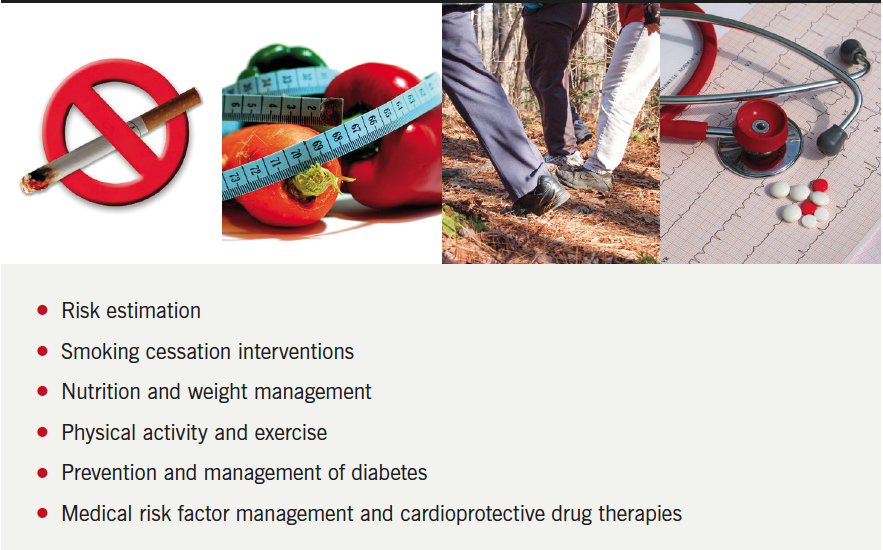Introduction
The scientific evidence for cardiovascular (CVD) disease prevention is compelling but, as demonstrated by the EUROASPIRE and ASPIRE-2-PREVENT surveys, translating this evidence into effective patient care in the real-world in clinical practice is challenging.1,2 However, the same academic group have undertaken a number of trials and have shown that it is possible to implement national and international clinical guidelines and achieve the lifestyle, medical and therapeutic targets associated with reduced cardiovascular events and improved health outcomes.3-5 In recognising the need to bridge the implementation gap for prevention and control of cardiovascular diseases, the combined research, teaching and clinical expertise at the National Heart and Lung Institute of Imperial College London launched a Masters (MSc), Postgraduate Diploma (PGDip) and Postgraduate Certificate (PGCert) in Preventive Cardiology. This programme was initiated in October 2008, offers many unique features and consequently remains the only one of its kind worldwide (box 1).
Box 1. Preventive cardiology at Imperial College London
Unique qualities creating a highly fulfilling student experience
Interdisciplinary and international:Inclusive of health professionals from a variety of backgrounds from all over the world
Flexible learning: All programmes include a taught component, which is combined with online learning, enabling students to work flexibly around other commitments. Students are able to interact with their tutors and fellow students via an advanced online virtual learning environment
Comprehensive and integrated: Our programme includes all aspects of preventive cardiology to include patients with established atherosclerotic disease, the relatives of patients with premature atherosclerotic disease, and also individuals who are asymptomatic, for example those with diabetes and those who are at high multi-factorial risk for cardiovascular disease
Knowledge, practical application and research skills acquisition:Clinical placements are completed across key areas of preventive cardiology practice, e.g. cardiovascular risk reduction clinics, cardiac rehabilitation, diabetes and heart failure, providing the opportunity to be immersed in the practicalities of current service delivery, rather than only learning the theory. The research component provides a strong foundation in practical use of research methods in preventive cardiology, and the translation of research evidence into best practice
Interaction with world leaders:Our teaching faculty comprises national and international leaders and clinical specialists from cardiology, nursing, nutrition, exercise and behavioural medicine. Our programme is based in the International Centre for Circulatory Health and, as a result, draws on considerable teaching expertise and provides high-quality research opportunities in a range of relevant subjects. We also have an expert lecture series allowing our students to interact with world leaders in the prevention and management of cardiovascular disease
Imperial College London:Imperial College has a world-renowned reputation and is currently rated in the top 10 universities worldwide
Programme content
The scientific foundation of the programme is lifestyle change (smoking cessation, healthy food choices and physical activity) through behavioural approaches, together with weight management, medical management of blood pressure, blood lipids and blood glucose, and use of cardioprotective drug therapies. All students complete a core compulsory module entitled ‘Preventive Cardiology Theory and Practice’,which includes six themes (box 2). These themes are then explored in greater detail in specialist optional modules. Students, depending on the direction of their studies, also engage in modules in clinical practice (clinical placements), research methods and complete an original research project in the field of preventive cardiology.

Blended programme
This programme aims to be flexible and accommodate each individual’s needs, this arrangement is particularly important for those who are at work and also studying in the programme. Each module starts with a block of face-to-face teaching followed by a number of purposefully designed online learning resources. All of these teaching sessions are recorded using lecture captures, giving our part-time students some flexibility to either attend or alternatively participate via our monitored virtual-learning environment at a convenient time to each individual (figure 1).
Centres of excellence in preventive cardiology
This programme aims to produce graduates equipped to fill specialist posts and set up centres of excellence in preventive cardiology by combining knowledge and skill acquisition with real-world application and research practice – ambassadors of preventive cardiology trained to ‘raise the standards of care in the prevention and management of cardiovascular disease’.
For further information contact: preventive.cardiology@imperial.ac.uk or visit:
http://www1.imperial.ac.uk/medicine/teaching/postgraduate/preventivecardiology/
References
- Kotseva K, Wood D, De Backer G et al.; EUROASPIRE Study Group. Cardiovascular prevention guidelines in daily practice: a comparison of EUROASPIRE I, II, and III surveys in eight European countries. Lancet 2009;373:929–40. http://dx.doi.org/10.1016/S0140-6736(09)60330-5
- Kotseva K, Jennings CS, Turner EL et al.; ASPIRE-2-PREVENT Study Group. ASPIRE-2-PREVENT: a survey of lifestyle, risk factor management and cardioprotective medication in patients with coronary heart disease and people at high risk of developing cardiovascular disease in the UK. Heart 2012;98:865–71. http://dx.doi.org/10.1136/heartjnl-2011-301603
- Wood DA, Kotseva K, Connolly S et al.; EUROACTION Study Group. Nurse-coordinated multidisciplinary, family-based cardiovascular disease prevention programme (EUROACTION) for patients with coronary heart disease and asymptomatic individuals at high risk of cardiovascular disease: a paired, cluster-randomised controlled trial. Lancet 2008;371:1999–2012. http://dx.doi.org/10.1016/S0140-6736(08)60868-5
- Connolly S, Holden A, Turner E et al. MyAction: an innovative approach to prevention of cardiovascular disease in the community. Br J Cardiol 2011;18:171–6. Available from: https://bjcardio.co.uk/2011/08/ myactionaninnovativeapproachtothe preventionofcardiovasculardisease/
- Jennings CS, Kotseva K, De Bacquer D et al. EUROACTION preventive cardiology programme plus intensive smoking cessation with Varenicline. Eur J Cardiovasc Nurs 2012;11(suppl 1):S4. http://dx.doi.org/10.1177/1474515112441129


